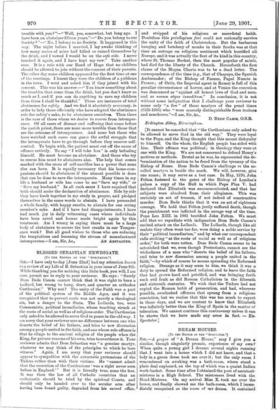BLESSED SEBASTIAN NE WDIGATE.
[TO THE EDITOR OP THE "SPECTATOR."]
Sin,—I have only to-day [June 22nd] had my attention drawn to a review of my Life of B. Sebastian in your issue of June 8th. While thanking you for noticing this little book, you will, lam sure, permit me to reply to your reviewer. He says : "Surely Dom Bede Camm cannot think that it was right to burn a Lollard, but wrong to hang, draw, and quarter an orthodox Carthusian." Why not? The unity of the Faith was a part of the political system of the Middle Ages, and it was recognised that to pervert souls was not merely a theological sin, but a danger to the State. The Lollards, too, were Communists, political incendiaries, whose teaching struck at the roots of social as well as of religious order. The Carthusian only asked to be allowed to serve God in peace in the old way. I am sorry that your reviewer sees no difference between one who deserts the belief of his fathers, and tries to sow dissension among a people united in the faith, and one whose sole offence is that he clings to the ancient religion of the people when the King, for private reasons of his own, tries to overthrow it. Your reviewer admits that Dom Sebastian was "a genuine martyr, whatever we may think of the principles to which he bore witness." Again, I am sorry that your reviewer should appear to sympathise with the autocratic pretensions of the Tudors rather than with their victims. He "cannot admit that the execution of the Carthusians 'was a sight never seen before in England.' " But it is literally true, none the less. It was then the law of all Catholic countries that an ecclesiastic should be tried by the spiritual Courts, and should only be handed over to the secular arm after having been found guilty, degraded from his Reared office.
and stripped of his religious or sacerdotal habit. Doubtless this privilegiuva fori could not rationally survive the unity of the faith of Christendom. But the barbarous hanging and butchery of monks in their frocks was at that time an outrage on religious sentiment which horrified all. Europe, and it was actually the first of its kind in this country, where St. Thomas Becket, then the most popular of saints, had died for the liberty of the Church. Henceforth the first clause of the Magna Charta was to be a dead letter. The correspondence of the time (e.g., that of Chapuys, the Spanish Ambassador; of the Bishop of Faenza, Papal Nuncio in France ; of Ortiz, the Imperial agent in Rome) is full of this peculiar circumstance of horror, and at Venice the execution was denounced as "against all honest laws of God and men, and as novum atgue inauditum." In conclusion, it is not without some indignation that I challenge your reviewer to name only "a few" of those martyrs of the penal times (1535-1685) who "were scarcely distinguishable from traitors and murderers."—I am, Sir, &c., D. BEDE CAILM, O.S.B.
Brdington Abbey, Birmingham.
[It cannot be conceded that "the Carthusians only asked to be allowed to serve God in the old way." They were loyal to the Pope, and the King thought that this meant disloyalty to himself. On the whole, the English people has sided with him. Their offence -was political; in theology they were at one with the King. We are not concerned to defend Henry's motives or methods. Brutal as he was, he represented the de- termination of the nation to be freed from the tyranny of the Bishop of Rome. Dom Bede Camm's challenge re the so- called martyrs is beside the mark. We will, however, give one name; it may serve as a test case. In May, 1570, John Felton fastened to the gates of the Bishop of London's palace a copy of the Bull in which Pope Pius V. had declared that Elizabeth was excommunicated, and that her subjects were absolved from their allegiance. This was certainly an act of treason, if not indeed of constructive murder. Dom Bede thinks that it was an act of righteous courage. We hold that Felton justly suffered death, though the punishment was inflicted in the savage way of the time. Pope Leo XIIL in 1885 beatified John Felton. We must add that we repudiate with indignation Dom Bede Camm's excited attack on -the Lollards. The Lollards, though like all zealots they often went too far, were doing a noble service by their "political incendiarism," and by what our correspondent calls striking "at the roots of social as well as of religious order," for both were rotten. Dom Bede Camm seems to be astonished that we, even though Protestants, cannot see the wickedness of a man who "deserts the belief of his fathers, and tries to sow dissension among a people united in the faith,"—by which of course he means spreading the Reformed religion. Strange as it may seem to him, we think it was a duty to spread the Reformed religion, and to leave the faith -that had grown hard and petrified, and was bringing forth such evil fruit as did Roman Catholicism in the fifteenth and sixteenth centuries. We wish that the Tudors had not copied the Roman habit of persecution, and had, wherever possible, overlooked offences that sprang from a religious conviction, but we realise that this was too much to expect in those days, and we are content to know that Elizabeth was infinitely better than the King of Spain in the matter of toleration. We cannot continue this controversy unless it can be shown that we have made any error in fact. — ED. Spectator.]




















































 Previous page
Previous page